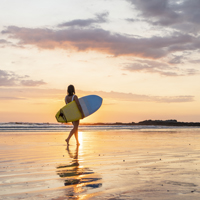How are healthcare services in Costa Rica?
When we asked expats and global nomads about the quality of medical care in Costa Rica, they replied...
"National health care may not provide a sufficient safety net - it may require a long wait for medical procedures. Private health care is recommended, but coverage for "pre-existing conditions" is generally not available except through national health care," explained one expat living in Tamarindo, Costa Rica.
 RelocateNow Costa Rica
RelocateNow Costa RicaConnect
RelocateNow Costa Rica's clients who run through the RelocateNow Program get quick results in formulating and successfully executing our laid out plan for moving to Costa Rica! Expert consulting for future expats in Costa Rica who wish to fast track the process of their move by receiving the specialized information they need, trustworthy connections within the country, and high level 1:1 support through the entire process.
Click connect to have our partner contact you via e-mail and/or phone.
 RelocateNow Costa Rica
RelocateNow Costa RicaRelocateNow Costa Rica's clients who run through the RelocateNow Program get quick results in formulating and successfully executing our laid out plan for moving to Costa Rica! Expert consulting for future expats in Costa Rica who wish to fast track the process of their move by receiving the specialized information they need, trustworthy connections within the country, and high level 1:1 support through the entire process.
Connect
Click connect to have our partner contact you via e-mail and/or phone.
"Costa Rica has a comprehensive healthcare system that provides a wide range of services to its citizens and foreign residents. The public healthcare system is funded by the government and is available to all citizens and legal residents. The quality of public healthcare is generally good, with modern facilities and well-trained staff. Foreign residents have access to the public healthcare system, although they may need to pay a fee for some services. Expats in Costa Rica can use the public healthcare system, but they may need to pay a fee for some services. Expats can also opt for private healthcare, which is more expensive but offers more comprehensive coverage," said another expat in Costa Rica.
Please login to continue reading this article.
Not a member? Join Today (it's free).
Other Questions:
- What do I need to know before moving to Costa Rica?
- How do I find a place to live in Costa Rica?
- What is a typical expat home or apartment like in Costa Rica?
- What is the average cost of housing in Costa Rica?
- Should I buy or rent a home in Costa Rica?
- What should I pack when moving to Costa Rica?
- What cultural faux pas should I try to avoid making in Costa Rica?
- Why do people move to Costa Rica?
- What are healthcare services like in Costa Rica?
- What are medical services in Costa Rica like?
- What are typical rents in Costa Rica?
- What appliances are typically included in a rental?
How are healthcare services in Costa Rica?
If you live in Costa Rica, newcomers to Costa Rica would love to hear your answer to this question:
About the Author
 Joshua Wood, LPC joined Expat Exchange in 2000 and serves as one of its Co-Presidents. He is also one of the Founders of Digital Nomad Exchange. Prior to Expat Exchange, Joshua worked for NBC Cable (MSNBC and CNBC
Primetime). Joshua has a BA from Syracuse and a Master's in Clinical and Counseling Psychology from Fairleigh Dickinson University. Mr. Wood is also a licensed counselor and psychotherapist.
Joshua Wood, LPC joined Expat Exchange in 2000 and serves as one of its Co-Presidents. He is also one of the Founders of Digital Nomad Exchange. Prior to Expat Exchange, Joshua worked for NBC Cable (MSNBC and CNBC
Primetime). Joshua has a BA from Syracuse and a Master's in Clinical and Counseling Psychology from Fairleigh Dickinson University. Mr. Wood is also a licensed counselor and psychotherapist.
Some of Joshua's articles include Pros and Cons of Living in Portugal, 10 Best Places to Live in Ireland and Pros and Cons of Living in Uruguay. Connect with Joshua on LinkedIn.



